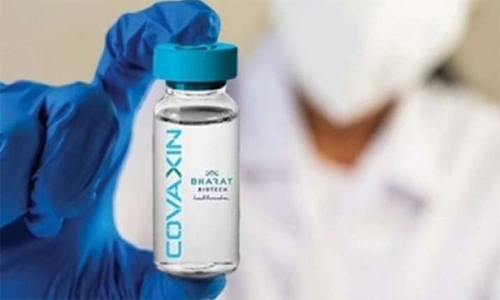What's Causing Delay In WHO's Covaxin Approval?
The Quint | New Delhi
The Daily Tribune – www.newsofbahrain.com
Indians who took two shots of Bharat Biotech's Covaxin may have to wait longer before they can travel abroad.
NDTV reported, quoting sources, that the World Health Organization (WHO) has further delayed the emergency use authorisation for the vaccine, as it has more technical queries that Bharat Biotech needs to answer before it gets approval. This comes even as the health ministry hinted that EUA from the WHO was imminent.
A Strategic Advisory Group of Experts (SAGE) meet, scheduled on 5 October, was likely to discuss the issue of the delay.
With international borders reopening, the lack of WHO nod has made those doubly vaccinated with some COVID-19 jabs – including Covaxin – be treated as 'unvaccinated' – making it difficult and even impossible in some situations to travel abroad.
What's On the Agenda at SAGE Meet?
Covaxin lauded as India's first indigenous vaccine against COVID-19, received emergency use authorisation from the Centre in January. It has been used in India's nationwide inoculation programme, along with Covishield, since the very beginning of January 2021.
Union Minister of State for Health Bharati Pravin Pawar said on 24 September that the WHO was expected to grant the EUA to Covaxin soon. However, before the final approval for EUA, there are crucial steps for Bharat Biotech to complete.
The Hyderabad-based company applied for WHO approval on 19 April, by providing Expression of Interest (EoI).
Now, for a vaccine to be approved by the WHO, it has to undergo the following steps:
- Acceptance of manufacturer's EoI
- Pre-session meeting between WHO and manufacturer
- Acceptance of dossier for review by WHO
- Decision on status of assessment
- The final decision on approval
However, in the case of Covaxin, WHO rejected Bharat Biotech's EoI and said that 'more information is required.'
Almost three months later, the Centre told Parliament that all documents required for the WHO’s nod have been submitted by 9 July.
Therefore, when the SAGE meet happens on 5 October, they are likely to review the clinical trial data of all three phases and take a call on whether they want to accept the EoI.
Why Did FDA Reject Bharat Biotech's Proposal?
On 11 June, the US Food and Drugs Administration (FDA), too, rejected Bharat Biotech's application for Covaxin approval.
The FDA’s refusal to grant emergency use authorisation to the Indian drug maker’s vaccine has been attributed to the lack of data made available on the clinical trials for the vaccine.
The company had reportedly submitted only partial data of clinical trials, excluding Phase 3 trial data.
Krishna Ella's company then announced that it no longer intends to seek EUA from the US authority but a 'full approval.'
The Many Hurdles For Covaxin
As Priyanka Pulla explained in LiveMint, Covaxin – repeatedly called India's first fully indigenous vaccine – suffered from poor transparency and mismanagement, ever since it first made the news.
Trouble started with the company's application for Central Drugs Standard Control Organisation (CDSCO) approval in December 2020 – which lacked data that supported that the vaccine prevented the disease.
In January, participants at the biggest site of a Covaxin clinical trial, Bhopal-based People’s Hospital, alleged mistreatment.
The two sponsors of the trial – Bharat Biotech and the Indian Council of Medical Research (ICMR) – denied it, calling it baseless.
In March, Brazil's vaccine regulatory body Anvisa pointed that the company had skipped some steps that made sure the SARS-COV-2 virus in the vaccine was fully killed. It also pointed that the company did not have evidence to prove that the virus was "incapable of multiplying in the human body."
This came at a time when India had already administered nine million doses of the vaccine. Bharat Biotech Chairman called it 'Brazillian nationalism' and the report simply a means to keep an Indian vaccine out.
Which Countries Have Approved Covaxin?
At present, eight countries, apart from India, have authorised the use of Covaxin – including Guyana, Iran, Mauritius, Mexico, Nepal, Paraguay, Philippines, and Zimbabwe.
With Covaxin not recognised by the European Medicines Agency (EMA), the Medicines and Healthcare Products Regulatory Agency (MHRA) in the UK, or Canadian and Australian authorities – those who wish to travel to these regions, will be considered 'unvaccinated'.
Therefore, these passengers, including those travelling for business or educational purposes, will have to mandatorily follow local quarantine protocols and undergo COVID tests as per norms.
The WHO approval is, therefore, crucial in other countries and their regulatory bodies opening their borders for those who have taken the Covaxin jab.
Related Posts

